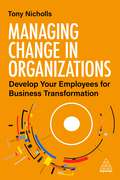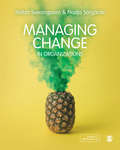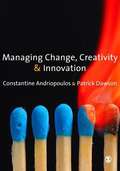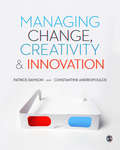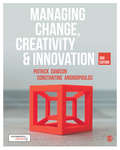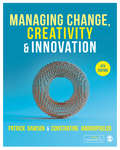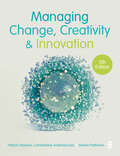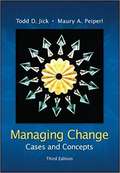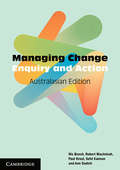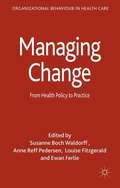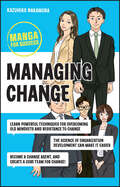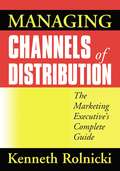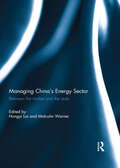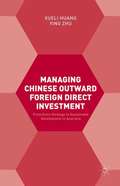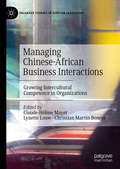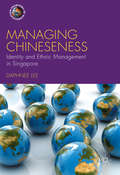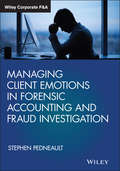- Table View
- List View
Managing Change in Organizations: Develop Your Employees for Business Transformation
by Tony NichollsYou don't have to be a change manager to be managing change. Written for managers, HR and OD professionals, this practical guide tells you everything you need to know to support effective business transformation. Managing Change in Organizations provides practical tips and examples on how to manage the people side of change as well as advice on how to engage staff and support them during times of business flux and uncertainty. There is also expert advice on how to ensure that all change activity in the company is aligned with the overall business goals whether this affects people, practices or processes.There is also expert guidance for HR, OD and management professionals on how to manage staff expectations, communicate change effectively and prioritize wellbeing during times of change. It includes practical tools which explain how to develop everyday activities to support the workforce through noticing, checking-in and navigating. Informed by the author's experience with both public and private sector organizations. this book is crucial reading for all HR and OD professionals as well as line managers needing to manage change in their organizations.
Managing Change in Organizations: How, what and why?
by Dr. Stefan Sveningsson Nadja SörgärdeIn Managing Change in Organizations, Stefan Sveningsson and Nadja Sörgärde explore a broad range of perspectives on change management, encouraging critical reflection and making sense of a complex field of theories. Their unique approach based around three key perspectives of change will help students understand: How change is accomplished – the tool perspective What change means for those involved – the process perspective And Why is change initiated (and is it necessary) – the critical perspective This focus on the common how, what and why questions offers students the chance to learn pragmatic tools for managing change, as well as gain an in-depth understanding of different theories and their value. The book is complemented by a range of online resources including PowerPoint Slides, Multiple Choice Questions, and a selection of SAGE Business Cases and journal articles. Stefan Sveningsson is Professor of Business Administration at the School of Economics and Management, Lund University, Sweden. Nadja Sörgärde is a Senior Lecturer at the School of Economics and Management, Lund University, Sweden.
Managing Change in Organizations: How, what and why?
by Dr. Stefan Sveningsson Nadja SörgärdeIn Managing Change in Organizations, Stefan Sveningsson and Nadja Sörgärde explore a broad range of perspectives on change management, encouraging critical reflection and making sense of a complex field of theories. Their unique approach based around three key perspectives of change will help students understand: How change is accomplished – the tool perspective What change means for those involved – the process perspective And Why is change initiated (and is it necessary) – the critical perspective This focus on the common how, what and why questions offers students the chance to learn pragmatic tools for managing change, as well as gain an in-depth understanding of different theories and their value. The book is complemented by a range of online resources including PowerPoint Slides, Multiple Choice Questions, and a selection of SAGE Business Cases and journal articles. Stefan Sveningsson is Professor of Business Administration at the School of Economics and Management, Lund University, Sweden. Nadja Sörgärde is a Senior Lecturer at the School of Economics and Management, Lund University, Sweden.
Managing Change, Creativity and Innovation
by Constantine Andriopoulos Patrick Dawson"I would urge anyone with an interest in managing organisations, whether they be students or practising managers, to buy this book" - Bernard Burnes, Professor of Organisational Change, Manchester Business School, University of Manchester "Change is truly the one constant in business. As such, the ability to manage change and its drivers of innovation and creativity is essential. Thankfully, Andriopoulos and Dawson offer an exceptional treatise on this domain, insightful and engaging. I encourage management students at all levels to explore this work" - Marianne W. Lewis, Director of Kolodzik Business Scholars, University of Cincinnati Managing Change, Creativity and Innovation brings together comprehensive aspects of change management and creativity management, providing management and HR students with an accessible and wide-ranging resource for study, debate and inspiration. Balancing theory with practice, this book looks at the human side of managing change and creativity, treating them as interdependent aspects of management and organizations. Topics include: - Historical overview of business practice and theory - Understanding creativity and change - Managing individuals, teams and nurturing creativity - The creative economy and future of organizations Features include: - Coverage of all the important recent research in the field - Real-life topical case studies taken from the Financial Times - Interactive resources at the end of each chapter, including questions, exercises, topics for debate, recommended reading and web resources
Managing Change, Creativity and Innovation
by Constantine Andriopoulos Patrick M. DawsonThis bestselling text continues to provide a fresh approach to organisational change by linking it to the key drivers of creativity and innovation, but now contains improved coverage of approaches to change.<P><P> It explores change as a human and social process, looking at the vital role leadership, entrepreneurship and creativity play in change management, rather than viewing it as a series of systems and mechanisms. In doing so, it provides all the theoretical and practical understanding you will need as both a student of change and a future manager.<P>
Managing Change, Creativity and Innovation
by Costas Andriopoulos Professor Patrick DawsonThis book is not available as an inspection copy. For more information contact your local sales representative. A fresh approach to managing organizational change by looking at it as complex, dynamic and messy as opposed to a series of neat, linear stages and processes leading to success. Key to the approach is the idea that change, creativity and innovation all overlap and interconnect rather than being three separate areas of study and that managing the three together is central to organizations having the competitive edge in developing new technologies and techniques, products and services. The book continues to offer practical guidelines as well as a theoretical understanding of change, creativity and innovation. It delivers an equal balance of critical perspectives and sound ideas for organizational change and development and presents the idea that change can be proactive, driven by creativity and innovation. The new edition includes additional change management content including learning, personal change, managing the self, employability, developments in conventional Organizational Development and new emergent forms including appreciative inquiry. Along with a series of rich international case studies, including TNT Australia, Amazon, Leeds Rhinos, Jerusalem Paints, Alpha Pro Pump and KPMG. It is supported by a range of learning and revision aids including reflective exercises, review and discussion questions and hands-on research tasks. All of which help students to reflect on the material covered and provide a source for more open group discussion and debate. A companion website accompanies the book, with additional material including PowerPoint slides for lecturers and video links and access to SAGE journal articles for Students. Suitable for upper-level undergraduates and postgraduate students.
Managing Change, Creativity and Innovation
by Costas Andriopoulos Professor Patrick DawsonThis book is not available as an inspection copy. For more information contact your local sales representative. A fresh approach to managing organizational change by looking at it as complex, dynamic and messy as opposed to a series of neat, linear stages and processes leading to success. Key to the approach is the idea that change, creativity and innovation all overlap and interconnect rather than being three separate areas of study and that managing the three together is central to organizations having the competitive edge in developing new technologies and techniques, products and services. The book continues to offer practical guidelines as well as a theoretical understanding of change, creativity and innovation. It delivers an equal balance of critical perspectives and sound ideas for organizational change and development and presents the idea that change can be proactive, driven by creativity and innovation. The new edition includes additional change management content including learning, personal change, managing the self, employability, developments in conventional Organizational Development and new emergent forms including appreciative inquiry. Along with a series of rich international case studies, including TNT Australia, Amazon, Leeds Rhinos, Jerusalem Paints, Alpha Pro Pump and KPMG. It is supported by a range of learning and revision aids including reflective exercises, review and discussion questions and hands-on research tasks. All of which help students to reflect on the material covered and provide a source for more open group discussion and debate. A companion website accompanies the book, with additional material including PowerPoint slides for lecturers and video links and access to SAGE journal articles for Students. Suitable for upper-level undergraduates and postgraduate students.
Managing Change, Creativity and Innovation
by Patrick Dawson Costas AndriopoulosThis bestselling text brings a fresh and unique approach to managing organizational change, taking the view that change, creativity and innovation are interconnected. It offers a strong theoretical understanding of change, creativity and innovation along with practical guidance and ideas for organizational change and development. The fourth edition comes with: lots of brand-new case studies and examples from around the world extra content on innovation and technology extended discussion and an additional chapter on the people aspects of change that includes culture, sensemaking and temporality Written in an engaging and accessible style, this books is essential for those studying organizational change management or creativity and innovation.
Managing Change, Creativity and Innovation
by Patrick Dawson Costas AndriopoulosThis bestselling text brings a fresh and unique approach to managing organizational change, taking the view that change, creativity and innovation are interconnected. It offers a strong theoretical understanding of change, creativity and innovation along with practical guidance and ideas for organizational change and development. The fourth edition comes with: lots of brand-new case studies and examples from around the world extra content on innovation and technology extended discussion and an additional chapter on the people aspects of change that includes culture, sensemaking and temporality Written in an engaging and accessible style, this books is essential for those studying organizational change management or creativity and innovation.
Managing Change, Creativity and Innovation
by Patrick Dawson Costas Andriopoulos Steven PattinsonNow in its fifth edition, this bestselling text brings a fresh and unique approach to managing organizational change, taking the view that change, creativity and innovation are interconnected. It couples a strong theoretical understanding of change, creativity and innovation with practical guidance and ideas for organizational change and development. With over 40 international case studies, discussing renowned companies like Amazon, Canva, the NFL, and General Motors, as well as new topics such as social innovation in the creative sector, this edition offers real-world insights that resonate across industries. This book is a must-read for Change Management and Organizational Change modules, as well as those focussing on creativity and innovation. Patrick Dawson is Emeritus Professor of Management at the University of Aberdeen. Constantine Andriopoulos is Professor of Innovation and Entrepreneurship and Associate Dean for Entrepreneurship at Cass Business School, City, University of London. Steven Pattinson is Associate Professor of Entrepreneurship at Newcastle Business School, Newcastle University.
Managing Change, Creativity and Innovation
by Patrick Dawson Costas Andriopoulos Steven PattinsonNow in its fifth edition, this bestselling text brings a fresh and unique approach to managing organizational change, taking the view that change, creativity and innovation are interconnected. It couples a strong theoretical understanding of change, creativity and innovation with practical guidance and ideas for organizational change and development. With over 40 international case studies, discussing renowned companies like Amazon, Canva, the NFL, and General Motors, as well as new topics such as social innovation in the creative sector, this edition offers real-world insights that resonate across industries. This book is a must-read for Change Management and Organizational Change modules, as well as those focussing on creativity and innovation. Patrick Dawson is Emeritus Professor of Management at the University of Aberdeen. Constantine Andriopoulos is Professor of Innovation and Entrepreneurship and Associate Dean for Entrepreneurship at Cass Business School, City, University of London. Steven Pattinson is Associate Professor of Entrepreneurship at Newcastle Business School, Newcastle University.
Managing Change: Bullet Guides
by Tina KonstantOpen this book and you will Overcome barriers Control costs Monitor progress Get results
Managing Change: Bullet Guides
by Tina KonstantOpen this book and you will Overcome barriers Control costs Monitor progress Get results
Managing Change: Cases and Concepts (3rd Edition)
by Todd D. Jick Maury PeiperlManaging Change: Cases and Concepts, 3e by Todd Jick and Maury Peiperl is comprised of six modules that introduce common threads in the ensuing case studies and readings on organizational change. The materials in this edition—cases and readings—have been chosen and arranged to introduce change as an integrated process. Cases in the text represent a wide variety of change situations. Accompanying many cases are readings, likewise chosen to reflect a broad range of issues. Some readings provide theoretical underpinnings for a case, supporting the action: others challenge the action with alternative viewpoints. Still others provide broader context—views of the changing world, for example, or commentaries on how we look at change; ideas that go well beyond the issues in any particular case.
Managing Change: Enquiry and Action
by Nic Beech Robert Macintosh Paul Krust Selvi Kannan Ann DadichThe ability to manage change successfully is an essential part of business. It is a skill that is much valued by employers, and it is therefore one of the most commonly delivered courses. This book helps you to understand three key activities for managing change: diagnosing, explaining and enacting. Both practical and action-oriented, it gives students and managers the tools they need to deal with the messy reality of change. It combines theory and diagnostic tools with practical examples that focus on actions and outcomes. It also includes short vignettes and longer cases, from a range of international contexts, for classroom study or for use on distance learning courses. Managing Change is written for advanced undergraduates and graduate students taking modules on change management, strategy and organizations. Its class-tested approach has been successfully delivered in a wide variety of settings, including over fifty executive short courses with FTSE-listed businesses.
Managing Change: From Health Policy to Practice (Organizational Behaviour In Healthcare)
by Ewan Ferlie Louise Fitzgerald Anne Pedersen Susanne WaldorffManaging Change is about implementing health care reforms, policies and programs into everyday practices. The book explores organizational change in health care as influenced by contemporary policy and management concepts, and presents and applies theoretical perspectives.
Managing Change: Manga for Success (Manga for Success)
by Kazuhiko NakamuraCREATE A HIGH-PERFORMING TEAM BY EMPLOYING EFFECTIVE CHANGE MANAGEMENT Do you want to improve your current workplace or organization? Organization Development can teach you what steps you can take to achieve your goals. You’ll follow Chuji, a store manager at an automobile company who’s been sent to a troubled dealership branch and learn from the challenges he faces as he implements a series of managerial changes only to meet resistance and hostility from employees and leaders. You’ll also learn about: How to overcome obstacles and resistance to organizational change How to employ the principles of visibility, communication, and visioning while leveraging the strengths of your team The science of organizational development Managing Change is an indispensable roadmap to effective change management that will help you shift the mindset of your team members from individualism to one focused on the good of the organization and the team as a whole. Find out why the Manga For Success series—now available in English for the first time—is so popular in Japan, Korea, and beyond.
Managing Channels of Distribution: The Marketing Executive's Complete Guide
by Kenneth Rolnicki"Channels of distribution is one of the hottest areas in marketing and sales today. And no one understands the subject better than Ken Rolnicki! Managing Channels of Distribution supplies a much-needed source of knowledge and expertise that professionals can rely on. Based on case studies and real-life experience, the book explains the complexities of managing multiple channels -- distributors, dealers, manufacturer’s reps, VARs, private labels, brokers, wholesalers, retailers, and all the rest. In the process, Rolnicki explores both macro and micro business influences that affect channel effectiveness. Special attention is paid to the frustrating areas of channel power and conflict, the dangerous issue of legalities, and the most critical topic of all -- the channel design sequence."
Managing China's Energy Sector: Between the Market and the State
by Hongyi Lai and Malcolm WarnerSince China has now become the world’s largest energy consumer, its energy sector has understandably huge implications for the global economy. This book examines the transformation of China’s conventional and renewable energy sectors, with special attention to state-business relations. Two studies examine the development of China’s energy profile, especially China’s renewable energy. Two others explore governmental relations with state-owned enterprises (SOEs) and their reform. Despite drastic restructuring in the late 1990s, SOEs continue their oligopolistic control of the oil and gas sectors and even overshadow the stock market. Three studies investigate the factors that help propel the expansion of China’s conventional energy firms, as well as those producing renewable energy (i.e. solar PV industry). A study of China’s solar PV industry suggests that China’s governmental support for it has evolved from subsidising production (a "mercantile" stage aimed at expanding the industry’s global production and export share) to subsidising the demand side (aiming at expanding domestic demand and absorbing redundant manufacture capacity). Another review of this industry finds that firms tend to pay heavy attention to extra-firm institutional network relationships both inside and outside China, and that buyer-supplier networks are influenced by extra-local managerial education. The final chapter compares China’s provinces and their embedded carbon-footprints per capita in urban areas from a consumption perspective, using a self-organizing feature map (SOFM) model. This book was originally published as a special issue of the Asia Pacific Business Review.
Managing Chinese Outward Foreign Direct Investment: From Entry Strategy to Sustainable Development in Australia
by Ying Zhu Xueli HuangChina's outward foreign direct investment, for which Australia is one of the largest destinations, has rapidly increased and become an important source of global capital. Nevertheless, Chinese investors have encountered many challenges in making their investment decisions and managing their foreign direct investments for sustainable development and profitability. Managing Chinese Outward Foreign Direct Investment focuses on the management of Chinese outward foreign direct investment, particularly foreign subsidiaries established through merger and acquisition, at the organisational level. Considering investment as a process, the book addresses complex managerial issues from strategic entry decisions to corporate sustainable development. Particular emphases have been placed on the post-acquisition integration and management such as liability of foreignness mitigation, post-acquisition integration, corporate control and governance, human resources and cross-cultural management, and corporate social responsibility.
Managing Chinese-African Business Interactions: Growing Intercultural Competence in Organizations (Palgrave Studies in African Leadership)
by Claude-Hélène Mayer Lynette Louw Christian Martin BonessThis book provides deep insights into intercultural collaboration among business partners, employees, managers, and entrepreneurs in Chinese-African professional interactions. It presents cultural and theoretical knowledge on Chinese and African management, leadership, and philosophy. Chinese and African scholars and professionals share their insights into how to address intercultural management challenges proactively and successfully. The cases provide insights into a wide variety of industries and offer actual scenarios studied in governmental, parastatal, and private Chinese-owned organizations in twelve African countries. This book will benefit a broad readership including scholars in employment relations and business management as well as African and Chinese collaborators in academia, government, NGOs and industry.
Managing Chineseness
by Daphnee LeeThis book explores the personal experiences of professionals who are a part of the post-colonial and late-industrializing reality in the global value chain in Singapore. Looking at Chinese Singaporean employees at a French multi-national firm, the author explores the evolving social constructions of 'Chineseness'. Sociologist Manuel Castells once hailed Singapore as 'the only true Leninist project that has survived', and Lee revisits the Singapore 'social laboratory', addressing recent dialectics that transpire within the global political economy. Currently, professional actors need to address the demands of dual hegemony in response to China's rise in the Western-dominated capitalist political economy. Underlying these constructions are enduring dispositions that mediate interpretations of professionalism. The author puts to test the potential for change, surveying a large cohort of teachers as makers of future professionals. The question is, does change occur in the domain of practice or the habitus, if it is possible in the first place? The book will be of interest to scholars and students with an interest in Sociology, Identity and Ethnicity, Business Management, Globalisation, Organizational Sociology and Sociology of Education.
Managing Client Emotions in Forensic Accounting and Fraud Investigation (Wiley Corporate F&A)
by Stephen PedneaultManage client emotions in forensic accounting and fraud investigations While many resources exist that outline the primary functional aspects of conducting a forensic accounting or fraud investigation, this book is the first of its kind in addressing the significance of client emotions during investigations and how important the management of those emotions is to the investigation as a whole. Forensic accounting expert Stephen Pedneault has nearly 30 years of experience conducting such fraud investigations, and has become an expert in this form of holistic engagement management. In this comprehensive resource, Pedneault shares his real-world experiences to help the reader understand exactly what role client emotions can play in a fraud investigation, and how to acknowledge and address the emotions of all parties right from the start. Included in the book are pragmatic strategies for managing emotions throughout an engagement, starting with the initial client meeting. Readers will also learn how to develop their own personal approach to managing individuals’ emotions throughout an investigation, which has proven to be much more effective than ignoring or underestimating the role that emotions can play. The book: Is the first resource specifically addressing client emotions in fraud investigations Includes tips for dealing with emotions and managing expectations from the initial meeting Prepares practitioners for future engagements with a new, unique perspective on managing emotions Helps fraud investigators and forensic accountants develop their own personal approaches to dealing with individuals and their emotions For accountants, auditors, fraud investigators, and others in the field, this complete, groundbreaking resource is the quintessential guide to managing client emotions in forensic accounting and fraud investigations.
Managing Climate Change Business Risks and Consequences: Leadership for Global Sustainability
by Charles Wankel James A. F. Stoner Neil Washington Matt Marovich Kyle MillerAlthough the title of this volume and its major focus will be on one major aspect of global sustainability - climate change - this volume continues with the overall framing of the series: global sustainability is a multi-faceted, global, multi-generational, economic, social, environmental, and cultural phenomenon and challenge to our species.
Managing Climate Change: Lessons from the U.S. Navy
by Forest Reinhardt Michael W. ToffelThe U.S. Navy operates on the front lines of climate change. It manages tens of billions of dollars in assets on every continent and on every ocean, which take many years to design and build and then have decades of useful life. This means that it needs to understand now what sorts of missions it may be required to perform in 10, 20, or 30 years and what assets and infrastructure it will need to carry them out. Put another way, it needs to plan for the world that will exist at that time. The navy is clear eyed about the challenges climate change poses. It knows that the effects of a warmer world will expand the geographic scope of its mission and increase demand for its military and humanitarian services. Climate change will also decrease its capacity to deliver those services, as the risk of damage to its bases and ports increases. This article examines the Navy’s approach to climate change and reflects on the implications for business.
